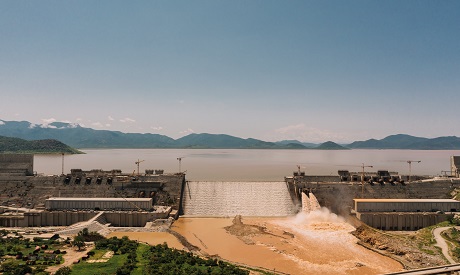
Photo posted on 19 July by Ethiopian Minister of Irrigation Seleshi Bekele of the completion of the second filling of the GERD. Twitter
The Russian Foreign Ministry has expressed its rejection of attempts to link its military cooperation with Ethiopia with the dispute of the Grand Ethiopian Renaissance Dam (GERD), calling for not politicizing the dam issue.
“Linking the military-technical cooperation between the Russia and Ethiopia with the uneasy and long-term negotiating process between Egypt, Sudan and Ethiopia on the construction of the Renaissance Hydroelectric Power Plant [GERD] on the Nile River is surprising,” the Russian Foreign Ministry said in the statement late on Friday.
The ministry stated that the Russian-Ethiopian cooperation in the military technical field “is based on a governmental agreement for defense cooperation.”
On 12 July, Russia and Ethiopia inked a military cooperation agreement at the conclusion of three-day deliberations of the 11th Ethiopia-Russia military technical cooperation joint meeting held in Addis Ababa.
Russia stressed in the Friday’s statement that the military agreement “doesn’t have any destabilizing character,” indicating that it “maintains similar joint cooperation with a number of other countries, including Egypt and Sudan."
Accordingly, the Russian ministry called for not politicizing the construction of the GERD so as to avoid any possible escalation of tension between the three parties.
“We believe that the chances of reaching a resolution acceptable to all within the framework of the tripartite negotiating mechanism mediated by the African Union have not expired yet," the Russian ministry said.
The settlement of the existing disputes between Ethiopia, Egypt and Sudan must be carried out in accordance with the spirit and provisions of the 2015 Declaration of Principles and on the basis of the preliminary understandings reached in the tripartite framework, the ministry noted.
The two downstream countries – Egypt and Sudan – have been negotiating with Ethiopia for a decade to reach a comprehensive and legally binding agreement on the GERD, which Addis Ababa has been building on the Blue Nile since 2011, but to no avail as the upstream country rather seeks mere guidelines that can be modified any time at its discretion.
On Monday, Ethiopia announced it fulfilled its unilateral second-year filling of the GERD, which both downstream countries condemned, with Cairo describing it as a "blatant and dangerous" violation of international laws as well as the Declaration of Principles signed in 2015.
Later, the Ethiopian foreign ministry said a win-win solution “is still within reach, but we cannot sign a final agreement”.
On 22 July, Russia’s Foreign Ministry Spokeswoman Maria Zakharova in a press briefing said that Moscow “is following closely the developments related to the GERD and fully aware of the significance of this matter for Addis Ababa and also for Egypt and Sudan”.
“Russia took an equidistant stance with regard to differences between the three countries regarding the filling and operation of the hydroelectric complex at the July 8 open meeting of the UN Security Council on this subject. We believe that a search for solutions should take place at trilateral talks under the African Union’s aegis,” Zakharova said.
The UN body held earlier this month a session on the GERD in an attempt to settle the dispute over the near-complete dam.
On 15 July, Egyptian President Abdel-Fattah El-Sisi stated in a public speech that “we managed to put the GERD issue on the international agenda during the UNSC meeting.”
El-Sisi reiterated Egypt’s demand for signing a legally binding agreement on the filling and operation of the GERD, saying: "let’s make a legally binding agreement that will bring prosperity, security and peace to all of us.”
“We offered to our brothers in Sudan and Ethiopia our cooperation and expertise in agriculture and energy on the condition that Egypt’s water rights not to be touched,” El-Sisi said. “We have the economic and military power to impose our will and defend our interests. We have several options and we will consider them according to the situation and the circumstances at time.”
Egypt, which relies on the world’s longest River Nile for more than 95 percent of its renewable water resources, fears that the unilateral filling and operation of the massive hydropower project will significantly diminish its water supply, which at 560 m3 per person annually is already well below the international threshold for water scarcity.
Egypt is considered one of the most water-scarce countries in the world, as it receives around 60 bcm annually — mainly from the River Nile — though its needs stand at around 114 bcm.
Short link: